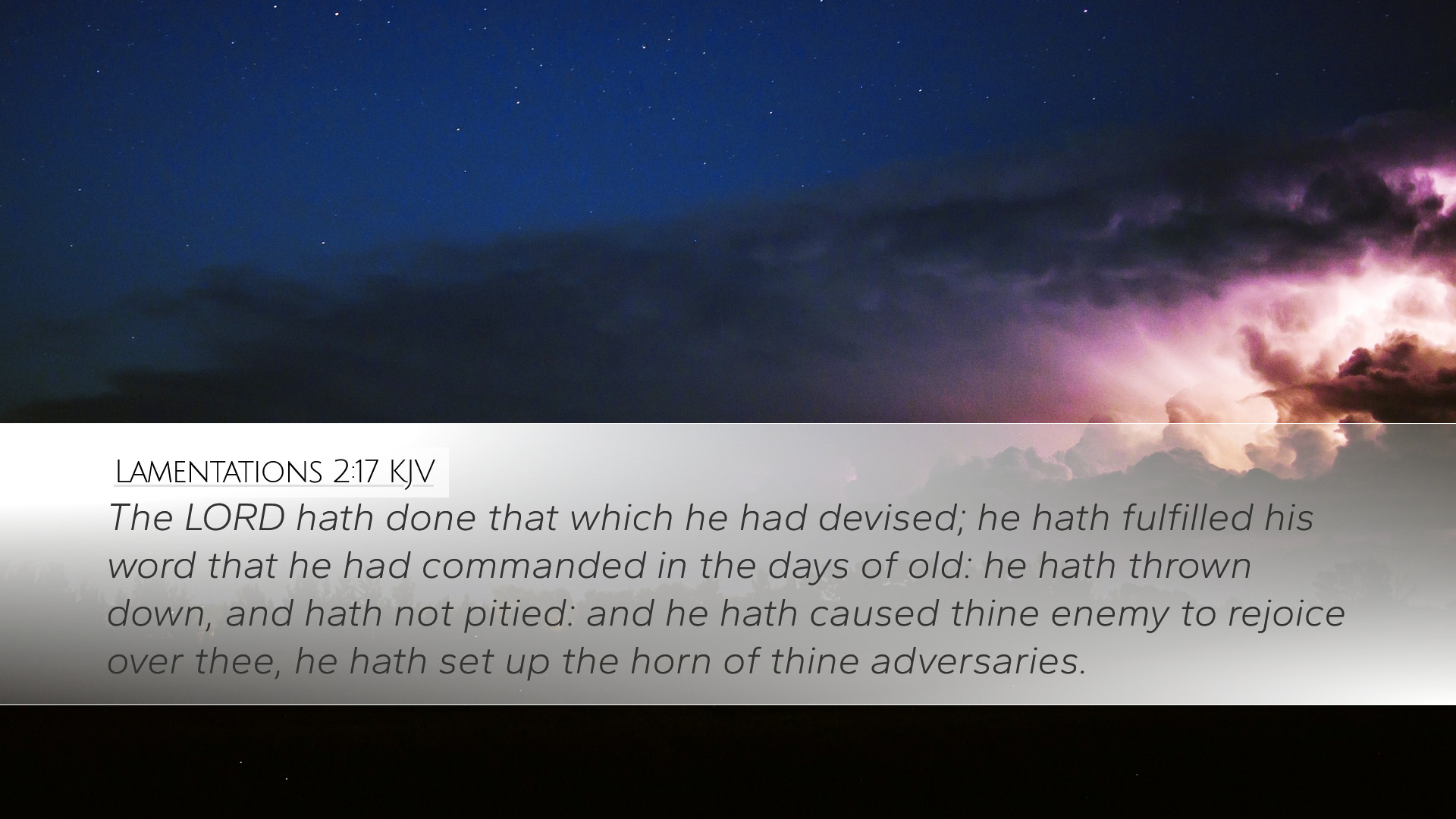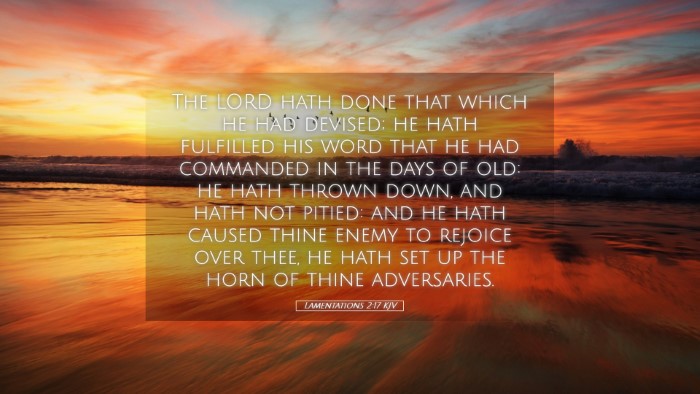Lamentations 2:17 - A Commentary
Verse Text: "The LORD hath done that which he had devised; he hath fulfilled his word that he had commanded in the days of old: he hath thrown down, and hath not pitied: and he hath caused thine enemy to rejoice over thee, he hath set up the horn of thine adversaries."
Introduction
The Book of Lamentations is a poignant collection of laments mourning the destruction of Jerusalem and the suffering of its people. Chapter 2, in particular, reflects on God's judgment and the resultant desolation. Verse 17 encapsulates a critical theological reflection on divine sovereignty and justice, making it a focal point for understanding Israel's plight.
Theological Insights
This verse reveals important aspects of God's character and His relationship with Israel. In essence, it speaks to the themes of divine judgment, the fulfillment of God's word, and the implications of covenant disobedience.
Divine Decree and Fulfillment
Matthew Henry emphasizes the unwavering fulfillment of God's plans. He notes that God’s providential actions reflect a steadfast commitment to His decrees. The phrase "The LORD hath done that which he had devised" indicates that the calamity which has befallen Jerusalem was not arbitrary but purposeful. This serves as a reminder that God’s sovereignty encompasses both blessing and judgment.
Albert Barnes highlights the fulfillment of God's word "that he had commanded in the days of old." This evokes the idea that God’s warnings through the prophets were unheard and unheeded. The silence of repentance led to a fulfillment of God’s word in the form of dire consequences, reinforcing that God is true to His covenant, both in promises and in judgments.
God's Justice and Mercy
The dual concepts of justice and mercy are critical in understanding this verse. Adam Clarke notes the lack of pity in God's judgment: "he hath thrown down, and hath not pitied." This statement reflects a significant truth about God’s nature; His justice does not exempt anyone from consequences when sin proliferates. However, Clarke also reflects on the long-suffering nature of God, which suggests that such judgment comes after periods of grace and opportunity for repentance.
Israel's Humiliation
The latter part of the verse speaks about the enemies of Israel rejoicing, suggesting a deep humiliation for God's people. Matthew Henry interprets this as a heart-wrenching reminder of God's people’s defeat and desolation. When enemies are elevated, it signifies that the protective hand of God was lifted, demonstrating a stark reversal of fortunes. The phrase "set up the horn of thine adversaries" metaphorically illustrates the power and strength of Israel's foes, accentuating their triumph at Israel’s expense.
Applications for Today
In applying this verse to contemporary contexts, several reflections arise:
- The Importance of Obedience: Just as Israel was held accountable for their covenant unfaithfulness, today’s believers are reminded of the seriousness of their calling to live in accordance with God’s commands. Disobedience has consequences, which can manifest in various forms.
- Understanding Divine Sovereignty: The fulfillment of God’s decrees reminds us that He is sovereign over history. This understanding provides comfort that, even amid chaos and suffering, God is working out His purposes.
- The Nature of God's Judgments: This verse can serve as a caution against complacency. While many may perceive God’s silence as tacit approval, this scripture reminds us that divine exile and judgment occur when a people turn away from Him.
- Emotional Processing of Suffering: Pastors and leaders can use this lament to help congregants articulate their own grief and suffering. Recognizing that God understands deep sorrow and devastation can lead to healing and restoration.
Conclusion
Lamentations 2:17 is a profound witness to the complexity of God's love, justice, and sovereignty. While it delineates a moment of despair for Israel, it invites us to reflect on our relationship with God. Each element of the verse echoes the centrality of covenant faithfulness, the implications of disobedience, and the hope that arises from divine revelation. In a world often overwhelmed by the adversities of life, this passage offers an essential perspective on enduring faith in the face of trials.


